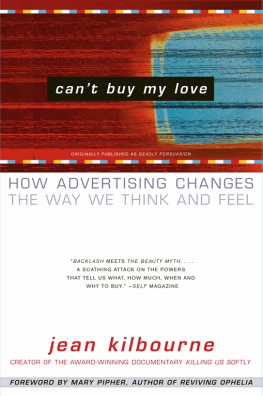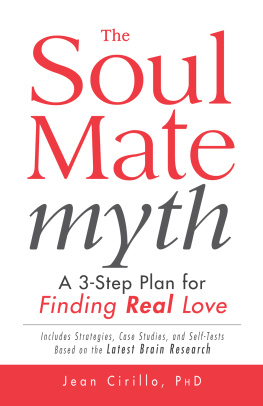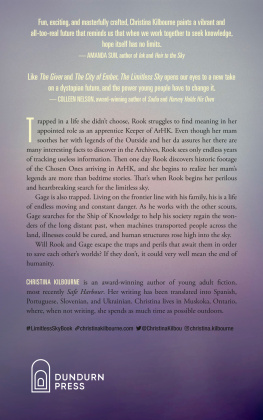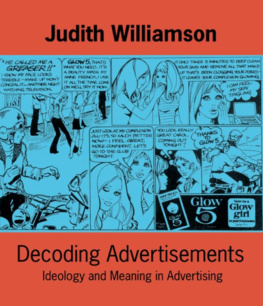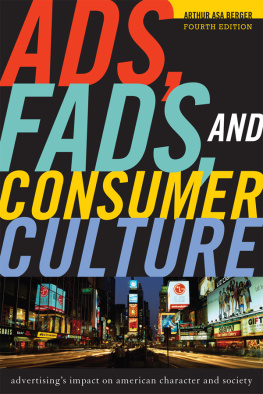DEADLY PERSUASION
When was the last time you felt this comfortable in a relationship?
AN AD FOR SNEAKERS
You can love it without getting your heart broken.
AN AD FOR A CAR
Until I find a real man, Ill settle for a real smoke.
A WOMAN IN A CIGARETTE AD
M any advertisements these days make us feel as if we have an intimate, even passionate relationship with a product. But as Jean Kilbourne points out in this fascinating and shocking expos, the dreamlike promise of advertising always leaves us hungry for more. We can never be satisfied, because the products we love cannot love us back.
Drawing upon her knowledge of psychology, media, and womens issues, Kilbourne offers nothing less than a new understanding of a ubiquitous phenomenon in our culture. The average American is exposed to over 3,000 advertisements a day and watches three years worth of television ads over the course of a lifetime. Kilbourne paints a gripping portrait of how this barrage of advertising drastically affects young people, especially girls, by offering false promises of rebellion, connection, and control. She also offers a surprising analysis of the way advertising creates and then feeds an addictive mentality that often continues throughout adulthood.
Jean Kilbournes work is pioneering and crucial to the dialogue of one of the most underexplored, yet most powerful, realms of American culture: advertising. We owe her a great debt.
Susan Faludi, author of Backlash
Jean Kilbourne, Ed. D, is internationally recognized for her pioneering work on alcohol and tobacco advertising and the image of women in advertising. A widely published writer and speaker who has twice been named Lecturer of the Year by the National Association for Campus Activities, she is best known for her award-winning documentaries, Killing Us Softly, Slim Hopes , and Pack of Lies . She lives in Boston, Massachusetts.

A TOUCHSTONE BOOK
Published by Simon & Schuster New York
Cover design and illustration by Yoori Kim
Visit us online at www.SimonandSchuster.com
Thank you for purchasing this Touchstone eBook.
Sign up for our newsletter and receive special offers, access to bonus content, and info on the latest new releases and other great eBooks from Touchstone and Simon & Schuster.

or visit us online to sign up at
eBookNews.SimonandSchuster.com

Mary Pipher

LETS START WITH TWO WORDS: GOLDEN ARCHES. WHATS THE FIRST thought that comes to your mind? I bet I know. Its the same thought that comes to everyones mind when they hear those words. You could be a vegetarian who never watches television; you would still know. We all know. Advertising in America really really works.
In Deadly Persuasion, Jean Kilbourne exposes the United States of Advertising as no one else has dared to before. With stories, research support, and cogent analysis, Kilbourne explores advertisings commodification of our lives, not only in America but all over the world. In Poland, where billboards with anorexic models sprout along the streets, or in Burma, where Leonardo DiCaprio beach towels hang in the markets, countries confront the glitzy perils of advertising and its bankrupt values. In a world increasingly organized around money and driven by hype, Kilbournes book is timely and important.
In her introduction, Kilbourne writes that her whole life has led her to this book. It is the culmination of her lifelong interest in feminism, advertising, and addictions, and it is full of heart. As a young woman, Kilbourne was brilliant (with a perfect score on the verbal SAT), well educated, and ambitious. But after graduating from Wellesley, she could find only secretarial jobs or work with employers who wanted sexual favors. Eventually she created her own job deconstructing advertising. Many of us first met Kilbourne in her electrifying film Killing Us Softly, which changed forever the way we view ads about women. But later, Kilbourne expanded her analysis into many areas, such as the effect of advertising on our values, relationships, and commitment to civic life.
In this book she debunks the idea that any of us are uninfluenced by advertising. Advertising works best precisely because we dont think it works on us. Kilbourne reports that the average American sees more than three thousand ads per day and spends more than three years of his or her life watching commercials. Their messages are inside our intimate relationships, our homes, our hearts, and our heads. She argues that our culture increasingly has adopted what John Maynard Keynes called the values of the casino. Advertising is a key purveyor of these casino values, and it contributes mightily to a climate of denial in which, as Kilbourne points out, relationships flounder and addictions flourish. The addict is, after all, the ideal customer; and when an addict gets well, someone loses money. Using recent mainstream advertisements, Kilbourne demonstrates how ads encourage us to objectify each other and to believe that our most significant relationships are with products. As she says, Ads turn lovers into things and things into lovers.
Jean Kilbourne shows that the main message is that happiness comes from products. Advertisers exploit our very real human desires for connection, calmness, respect, and excitement. Every emotion is used to sell something. The cumulative effect of all these ads is to leave us romantic about objects and deeply cynical about humans, who are after all much more complicated than products. (Who says guys are afraid of commitment? Hes had the same backpack for years.) Over and over, ads messages are that human relationships are fragile, difficult, and disappointing but products wont let us down. (The ski instructor faded away three years ago, but the sweater didnt.) But, Kilbourne points out, Products are only things, and no matter how much we love them, they wont love us back.
Kilbourne writes that our children are being buried alive in what David Denby calls an avalanche of junk. Twenty years ago, kids drank twice as much milk as soda. Thanks to ads, today the reverse is true. Both alcohol and cigarette companies target young children as consumers (in ads featuring Joe Camel, Spuds Mackenzie, and the Budweiser frogs) and sell them sugary, fruit-flavored products (Mrs. Puckers Alcoholic Orangeade and Tumblers, a 24 proof version of Jello shots). Advertisers also exploit adolescents social anxiety and need for approval and independence to sell them crap, some of it addictive crap. (Youve got what it takes... Salem Spirit.)
Kilbournes arguments are as focused and unassailable as those of a good prosecutor. Piece by piece she builds a case for an America deeply corrupted by advertisers. We are led via ads to expect transformation via products. Ads also steer us away from what really makes us happy: meaningful work, authentic relationships, and a sense of connection with history, community, nature, and the cosmos.
Americans think we know about advertising, but we dont. Our very complacency leaves us vulnerable. And developing countries urgently require education about the true costs of advertising. They need to learn not only that all that glitters is not gold, but also that it is sometimes poison. Kilbourne is our best, most thoughtful, most compassionate teacher.
Next page
